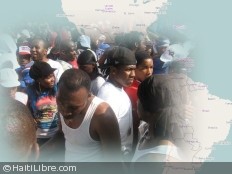|
||||||||||||||||||
|
|
Haiti - Social : Haitian migrants threatened to be repatriated across the continent 03/10/2012 09:30:12
Situation in the Turks and Caicos Islands : Last September, the British authorities of the Turks and Caicos Islands announced on the resumption of deportations of undocumented Haitians who arrived on the island before the 2010 earthquake. "The lifting of the suspension of deportations (to Haiti) is a decision of the Ministry of Border Control and Labor in order to apply the law in a firm, fair and effective manner", declared the permanent secretary of this ministerial body of the British Islands, Ms Clara Gardiner, to various media outlets. "Through the consolidation of our intelligence capacity and the signing of a joint protocol with the police, we're identifying all the threats and individuals seeking to breach the integrity of our borders, such as the boat-people, the coyotes (people smugglers) and other smugglers; we're looking for migrants involved in criminal activities or those who are harmful to our community", she affirmed. Situation in the French West Indies : In a press statement in early September, a number of migrant rights organisations on the French mainland and overseas reported the resumption of deportations of Haitian from the West Indies; measures which, theoretically, had been suspended since the 2010-earthquake. These organisations, which included Collectif Haïti de France (CHF)and Comité Inter Mouvements auprès des Évacués (CIMADE), harshly criticised the decision of the island-authorities of Guadalupe to expel a Haitian father of French national. The Haitian migrant was questioned "by the French border police while he was at work in Guadalupe... Later he was detained... and... taken to the Morne Vergain administrative detention centre (Guadalupe) to be deported to Haiti", the human rights organisations explained "When the [Christian migrant rights] organisation CIMADE asked the French Interior Minister about this grave situation, (the resumption of deportations of Haitians), he didn't dignify us with a response", they continued. Situation in Brazil : Currently, 210 Haitians are stranded in the town of Brasileia, close to the border with Peru and Bolivia, awaiting a decision on their immigration status by the Brazil government. The local Brazilian authorities began providing humanitarian assistance to the migrants, who arrived in a critical condition (dehydrated and hungry) after walking several days in the Amazonian jungle in Bolivia. The 210 migrants set out from the Peruvian town of Iñapari, bordering Bolivia and Brazil, where they had lived for months without any assistance from the authorities and unable to cross into a Brazil determined to keep its borders closed. As time passed the local authorities of Brasileia become increasingly unwilling to provide humanitarian assistance due to lack of funding. According to the local authorities, they informed the central government of the presence of the migrants. The Brazilian government has yet to decide whether or not to regularise their legal status or to expel them. Moreover, it is not known if they will be sent back home or push back into Peru. "Government policy is to fight organised crime which uses migrants to its advantage", said the minister for foreign affairs in Brazil, Antonio Patriota, who stressed it was unlikely the government would grant more Haitians residency for humanitarian reasons. Situation in Ecuador : In July, a Haitian was arrested by the immigration police on the streets of the Ecuadorian capital, Quito, after a routine check brought to light his irregular status in the country. The court gave the migrant 90 days to regularise his legal status, after which he was issued with a deportation order. A ruling on the case by the constitutional court is expected shortly. The outcome of the case will significantly influence the future of Haitian migrants in Ecuador, as it may represent a legal precedent. Meanwhile, many human rights organisations and migrants have called on the government not to deport all undocumented Haitians in Ecuador. Situation in the Dominican Republic : "Under the new administration of President Danilo Medina, the migration authorities have continued deporting Haitian migrants, using the same illegal procedures adopted in the past", underlined a statement issued this September by the Jesuit Migrant Service in the southwest border city of Jimaní. These irregular procedures consist in the violation of international migrant rights agreement to which the Dominican Republic is a party, as well as its failure to respect the 1999 protocol of understanding regarding repatriation mechanisms between the Dominican Republic and Haiti. The big fear is that the new Dominican administration will continue the same migration policies, characterised by the deportation of Haitians without respect for due process, the withdrawal of Dominican nationality of Dominicans of Haitian origin, and the violation of international and regional human rights instruments. See also : https://www.haitilibre.com/en/search.php?q=migrants&d=1 HL/ HaitiLibre
|
|
|
Why HaitiLibre ? |
Contact us |
Français
Copyright © 2010 - 2024 Haitilibre.com |



